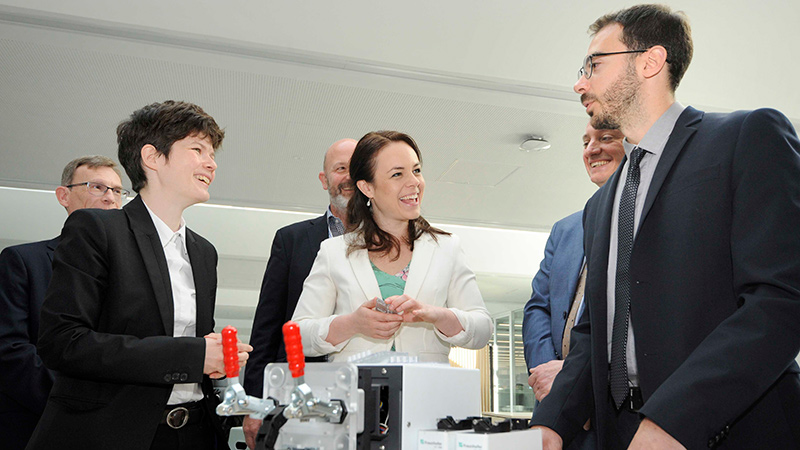Published:

Researchers from Heriot-Watt University's Natantis team are developing an innovative device that could revolutionise the way blood samples are prepared for use in cancer diagnosis.
The Natantis team, which hopes to spin-out into a commercial venture by 2020, has created the CNAsafe device to extract cell-free nucleic acids (cfNA) from whole blood. The demand for the type of testing this facilitates – known as liquid biospies – is growing, as it replaces invasive and often impractical tissue biopsies.
Extracting cfNA from blood has until now been a labour-intensive, highly-skilled and time-consuming process taking place across two distinct stages, often in different locations up to one week apart. Using CNAsafe samples could be extracted in just 45 minutes to deliver results that are more reliable, of a higher quality and cheaper to produce.
The team has just been awarded £574,000 from Scottish Enterprise's High Growth Spin-Out Programme (HGSP) as it continues to attract commercial interest and is in discussion with a number of potential investors.
Natantis' Principal Investigator Dr Maiwenn Kersaudy-Kerhoas said: “Scottish Enterprise's High Growth Spin-out Programme is a fantastic opportunity to bridge the gap between the academic lab and the commercial enterprise. We are getting essential support from both Scottish Enterprise and Heriot-Watt and we're looking forward to moving to the new GRID building as an incubator for Natantis, just a stone's throw from Edinburgh Airport, with all the benefits of the campus' facilities.”
Today (Thursday 16 May), the Public Finance Minister Kate Forbes visited the Natantis team to see the device first-hand.
She said: “Scotland has a thriving life sciences community, and a long history of world-changing innovation. The Scottish life sciences sector is incredibly innovative, accounting for almost a quarter of Scotland's Business Enterprise Research and Development spend in 2017.
“The results of this can be seen in projects like Natantis which, with its CNAsafe device, has designed a truly innovative Scottish product with the potential to have a real impact on the liquid biopsy process.
“The product has already shown promising commercial interest, proving its very real market and giving Natantis the opportunity to develop into a major contributor to Scotland's life sciences sector.”
The visit took place at Heriot-Watt's new GRID building. Located at the university's Edinburgh campus, this ground-breaking facility is designed to foster strong collaboration between the university, industry and enterprise partners. GRID – which stands for Global Research Innovation and Discovery – is fully-equipped with next generation technologies that empower students, entrepreneurs and start-ups to commercialise creative ideas and shape future industry.
Andrew Henderson of Scottish Enterprise's High Value Manufacturing and Health team, said: “Through HGSP we work with leading academics all over Scotland to help turn their innovative ideas into successful business ventures. The Natantis team is an excellent example of this, with its innovative solution for faster, cheaper, more reliable and better-quality samples for vital health screening.
“There is a very real market opportunity here and with its CNAsafe device the Natantis team is primed to seize that opportunity. I look forward to following the team's progress as they spin-out into a fully-fledged company and make their mark on the world of medicine.”
The funding announcement comes as Heriot-Watt University embarks on a Year of Health campaign which is a calendar of engagement that spans schools, communities, businesses and government. Throughout 2019, the campaign will highlight the university's research and the ground-breaking discoveries that are helping drive innovations in healthcare, diagnosis and treatment.